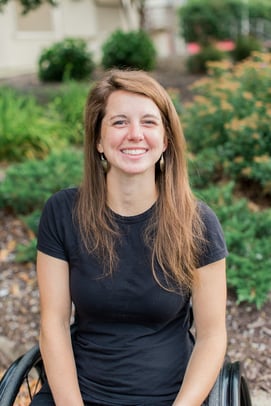In my 15 years of being and associating with people who are paralyzed, I’ve heard more than a couple of people express the sentiment of being a “burden.”
That mindset has octopus arms that touch many different causes, but I’m focusing on one of the main contributors: apologizing for your disability.
In other words, apologizing for something you have no control over – absolutely none. So, why are you feeling guilty? It may sound silly, but I’ve seen this play out hundreds of times. It can sound something like:
"Sorry to bother you. Is there an accessible entrance?"
"This seat isn’t accessible for my wheelchair. Can you move down? Sorry!”
“Sorry for occupying the big bathroom stall! I’ll be out soon.”
Even when you don’t use the word “sorry,” feeling the need to apologize in the first place is a shining example of internalized ableism. Don’t call me overly sensitive here – it’s a hard feeling not to keep. Even if people don’t verbally express their exasperation, I can sometimes see it in the reaction of their faces.
Is this my self-consciousness talking? I don’t think so but correct me if I’m wrong.
Most people are eager to shuffle around to accommodate my wheelchair, but there are a few who aren’t so keen. Unfortunately, those are the ones I remember.
It's no wonder the disabled population is prone to feeling like a burden - we're treated like one both implicitly and explicitly. I went to lunch with someone recently who, like me, uses a wheelchair and, like me a decade ago, was stuck in the Burden Mindset. That meant he slunk into the shadows, didn’t speak up for himself, and apologizes, either out loud or in his head, for the extra “work” he requires. When you feel that way, it’s tough to get anything done.
Put simply: that kind of thinking is all wrong and, the scary part is, it’s a self-fulfilling prophecy.
At this point, I feel like a broken record when I talk about over-apologizing. I am, once again, going to demand you to stop apologizing for things out of your control. I’m also constantly reminding myself of that.
In the past year, I’ve made a conscious effort not overuse the word "sorry" because, I noticed, it has lost its meaning. I even graduated to the phrase “I apologize,” with hopes that I would sound more academic and not as much of a broken record. As it goes, that one lost its meaning, too. I eventually ran out of “sorry” synonyms, my apologizing had me in a state of vulnerability, and I just had to stop altogether. Instead, I picked up another bad habit: weak solicitations.
My “sorry for taking up space” turned into:
“Will you not park in the striped lines next to the handicap parking spot? I need extra room for my wheelchair.”
“I moved the merchandise out of my path so I can roll through your store, but I’ll put it back when I leave.”
“I’m too tired to go out tonight, but I’ll make it up to you by treating to dinner tomorrow.”

